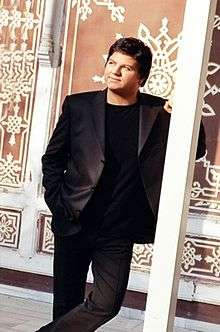Ramazan Kubat
| Ramazan Kubat | |
|---|---|
 | |
| Background information | |
| Birth name | Ramazan Kubat |
| Also known as | Kubat |
| Born |
4 October 1974 Antwerp , Belgium |
| Origin | Turkey |
| Genres | Turkish folk music |
| Occupation(s) | Singer-songwriter |
| Years active | 1980–present |
| Website | Kubat.com |
Ramazan Kubat (born 4 October 1974 in Antwerp, Belgium), also known as Kubat, is a Turkish folk singer and composer distinguished with his particular style and his applied use of electronic instruments in his songs.
Early life
Kubat was born in Antwerp in 1974. His father was a Turkish Alevi and his mother is a Sunni Turk origin from Emirdağ-Karacalar village. His uncle is a Hafiz (a person who has memorized the complete Quran) in the same village.[1] He is now based in Turkey since over a decade, he was advantaged by the opportunities and outlets his talents found already at a very early age. He started to play his father's "cura" (a smaller version of bağlama) at the age of five, he sang in a restaurant at age eight and was even admitted in his teens into a 300-member church choir as its only Muslim member according to his web site. His family has an artistic background: his uncle Şemsettin Kubat is an important poet of Turkish folk literature who is based in Emirdağ.[2]
Career
Based principally in Turkey as of the end the 1980s, Kubat released his first album, carrying the same title as his screen name, "Kubat", in 1996. Nine other albums, each presenting particular characteristics, have been released by Kubat. These are;
- 1998: Bugün (Today)
- 1999: Bir ayrılık, bir yoksulluk, bir ölüm (A separation, a poverty, a death)
- 2001: Arşiv (Archive) 1-2-3. Consisting of a set with three albums uniting 35 anonymous Turkish folk songs, this album was notable in displaying Kubat reaching deep into the traditions, to come out strengthened in his art. The album was accompanied by an 80-page booklet prepared in eight languages giving details of the story related to each song.
- 2003: Lokman on the other hand was a tentative tour de force encompassing diverse influences from rock music, pop music, jazz and classical music introduced into Turkish folk music
- 2005: Yare doğru (Towards the loved one), produced in a more conservative outlook
- 2008: Kubat 2008
- 2010: İnce İnce
- 2013: İyi Olcaksın
- 2016: Al Ömrümü
His efforts for combining the traditions with international and novel elements were consecrated in a huge concert in 2002, orchestrated by René Giessen, titled "Anadolu Güneşi" (Anatolian Sun) and held in Istanbul Lütfi Kırdar Convention and Exhibition Center.
Discography
Albums
- Kubat (1996)
- Bugün (1998)
- Bir Ayrılık, Bir Yoksulluk Bir Ölüm (1999)
- Arşiv 1-2-3 (2001)
- Lokman (2003)
- Yare Doğru (2005)
- Kubat 2008 (2008)
- İnce İnce (2010)
- İyi Olcaksın (2013)
- Al Ömrümü (2016)
Notes and references
- ↑ http://www.zaman.com.tr/haber.do?haberno=1002384&title=babam-alevi-annem-sunni-ben-her-ikisiyim&haberSayfa=1%5Bpermanent+dead+link%5D at 14-08-2012 - can be traced at: Zaman.com.tr
- ↑ Profile: "Şemsettin Kubat" Check
|url=value (help) (in Turkish). Turkish Ministry of Culture.
External links
| Wikimedia Commons has media related to Singer-songwriters from Turkey. |